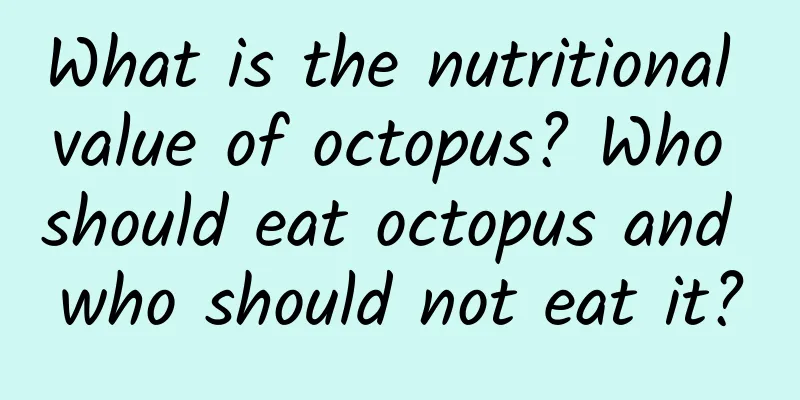What is the nutritional value of octopus? Who should eat octopus and who should not eat it?

|
Octopus has good nutritional value and is a high-protein, low-fat, cholesterol-free fish food. It often appears on our dining table and looks very appetizing. It is also a favorite of some friends. Next, let's take a closer look at the suitable and taboo groups for octopus. Contents of this article 1. What is the nutritional value of octopus? 2. People who are suitable for eating octopus and people who are not suitable for eating octopus 3. What should not be eaten with octopus? 1What is the nutritional value of octopus?The calorie content of octopus is 135 kcal (100 grams of edible part). It is rich in high-quality protein, a small amount of unsaturated fatty acids, and trace elements such as vitamin A, vitamin E, thioflavin, niacin, as well as nutrients such as calcium, phosphorus, selenium, magnesium, potassium, and sodium. It has good nutritional value and is a high-protein, low-fat, cholesterol-free fish food. 2Suitable and unsuitable people for eating octopus1. Suitable people: Since octopus can replenish blood and qi, and at the same time can lower blood pressure and enhance the body's immunity, it is suitable for people with weak constitution, high blood pressure, high blood lipids and those who have just recovered from a serious illness. 2. Contraindications: People who are allergic to seafood should not eat it. 3What can't be eaten with octopus?1. Foods rich in tannic acidOctopus is a kind of seafood, rich in protein and flavor amino acids, and tastes delicious. However, octopus should not be eaten with foods rich in tannic acid, such as persimmon, pomegranate, sour plum, mustard, plum, toon, hawthorn, and bitter greens, because the complex formed after the protein tannic acid reacts in the stomach is not easy to digest, which will reduce the nutritional value of the octopus. 2. Cold foodsOctopus is a food from the seabed, and it has a strong coldness. Eating it will increase the coldness in the body. Some people with weak spleen and stomach or who eat too much with other cold foods will have too much coldness in the body, and their intestines will be slippery, which will easily cause diarrhea and other physical discomfort. Therefore, it is recommended to eat it together. Common cold foods include: raw lotus root, crab, clams, clams, watermelon, persimmon, mung bean, kelp, bitter gourd, etc. |
<<: Why does the octopus shrink? Why is it so hard to chew the octopus?
>>: What are the benefits of eating octopus? How to tell if octopus has seeds?
Recommend
What to do if you have stomach pain and diarrhea during your fifth month of pregnancy
Diarrhea is a disease that most people suffer fro...
What to do if the contractions are not strong
Pregnant women are both happy and painful during ...
Medical abortion bleeding but no gestational sac expelled
Medical abortion is achieved by taking drugs that...
Swelling of the milk ducts
The swelling of the mammary ducts is caused by ba...
How to treat accessory breast hyperplasia?
Life is really beautiful. A greeting, a hearty la...
Will having an IUD affect menstruation?
Everyone must be concerned about whether IUD inse...
Tooth extraction can really kill you! From hammering teeth to minimally invasive techniques, here's a look at the evolution of human tooth extraction surgery!
Tooth extraction is a "terrifying" oper...
Can I make up for the bad confinement period?
Giving birth is difficult, and many pregnant wome...
Brown discharge after IUD insertion, what causes it?
IUD insertion is a means of long-term contracepti...
Cervical ripening test
Cervical maturity examination is one of the inter...
What to do if it itches in the lower body? What ointment to use?
In fact, itching in the lower body is a common di...
Mastitis surgery scar
Whether it is during pregnancy or breastfeeding, ...
How does muscle aging affect metabolic function? The latest publication by Josef M. Penninger, an academician of the Austrian Academy of Sciences
Source: "BTIT Club" official account As...









